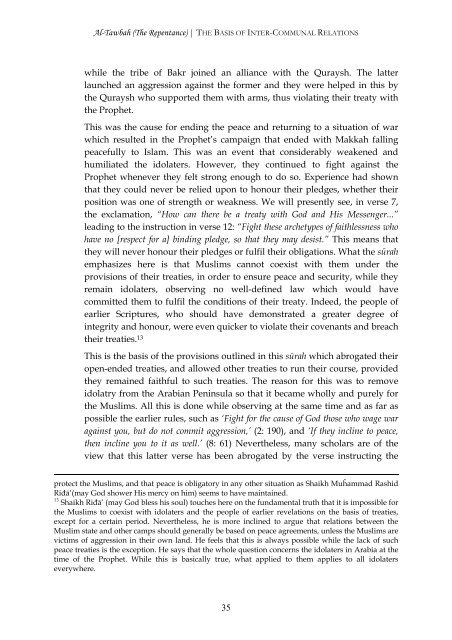Volume 8 Surah 9 - Enjoy Islam
Volume 8 Surah 9 - Enjoy Islam
Volume 8 Surah 9 - Enjoy Islam
- No tags were found...
Create successful ePaper yourself
Turn your PDF publications into a flip-book with our unique Google optimized e-Paper software.
Al-Tawbah (The Repentance) | THE BASIS OF INTER-COMMUNAL RELATIONSwhile the tribe of Bakr joined an alliance with the Quraysh. The latterlaunched an aggression against the former and they were helped in this bythe Quraysh who supported them with arms, thus violating their treaty withthe Prophet.This was the cause for ending the peace and returning to a situation of warwhich resulted in the Prophet’s campaign that ended with Makkah fallingpeacefully to <strong>Islam</strong>. This was an event that considerably weakened andhumiliated the idolaters. However, they continued to fight against theProphet whenever they felt strong enough to do so. Experience had shownthat they could never be relied upon to honour their pledges, whether theirposition was one of strength or weakness. We will presently see, in verse 7,the exclamation, “How can there be a treaty with God and His Messenger...”leading to the instruction in verse 12: “Fight these archetypes of faithlessness whohave no [respect for a] binding pledge, so that they may desist.” This means thatthey will never honour their pledges or fulfil their obligations. What the sūrahemphasizes here is that Muslims cannot coexist with them under theprovisions of their treaties, in order to ensure peace and security, while theyremain idolaters, observing no well-defined law which would havecommitted them to fulfil the conditions of their treaty. Indeed, the people ofearlier Scriptures, who should have demonstrated a greater degree ofintegrity and honour, were even quicker to violate their covenants and breachtheir treaties. 13This is the basis of the provisions outlined in this sūrah which abrogated theiropen-ended treaties, and allowed other treaties to run their course, providedthey remained faithful to such treaties. The reason for this was to removeidolatry from the Arabian Peninsula so that it became wholly and purely forthe Muslims. All this is done while observing at the same time and as far aspossible the earlier rules, such as ‘Fight for the cause of God those who wage waragainst you, but do not commit aggression,’ (2: 190), and ‘If they incline to peace,then incline you to it as well.’ (8: 61) Nevertheless, many scholars are of theview that this latter verse has been abrogated by the verse instructing theprotect the Muslims, and that peace is obligatory in any other situation as Shaikh Muĥammad RashidRiđā’(may God shower His mercy on him) seems to have maintained.13 Shaikh Riđā’ (may God bless his soul) touches here on the fundamental truth that it is impossible forthe Muslims to coexist with idolaters and the people of earlier revelations on the basis of treaties,except for a certain period. Nevertheless, he is more inclined to argue that relations between theMuslim state and other camps should generally be based on peace agreements, unless the Muslims arevictims of aggression in their own land. He feels that this is always possible while the lack of suchpeace treaties is the exception. He says that the whole question concerns the idolaters in Arabia at thetime of the Prophet. While this is basically true, what applied to them applies to all idolaterseverywhere.35
















